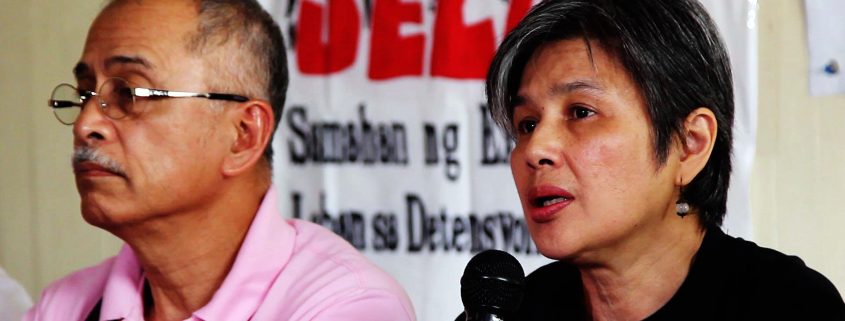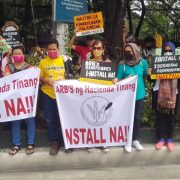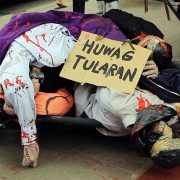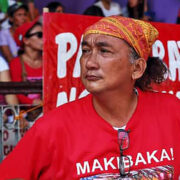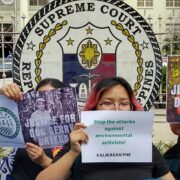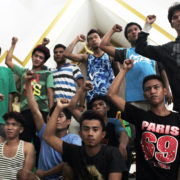High Court’s Marcos burial decision dismays Martial Law victims
By April Layad B. Ayroso
PROGRESSIVE organizations expressed dismay at the Supreme Court’s decision to dismiss the six petitions against the burial of the late dictator Ferdinand Marcos at the Libingan ng mga Bayani (LNMB).
The justices of the SC voted 9-5 in favor of dismissing the petitions against the order of President Rodrigo Duterte to have the late strongman buried at the LNMB 27 years after his death in exile in Hawaii.
Associate Justices Arturo Brion, Presbitero Velasco Jr, Diosdado Peralta, Lucas Bersamin, Mariano del Castillo, Jose Perez, Teresita de Castro, Jose Mendoza, and Estela Perlas-Bernabe voted in favor of Marcos’ burial at the LNMB.
Chief Justice Maria Lourdes Sereno, Senior Associate Justice Antonio Carpio, and Associate Justices Marvic Leonen, Francis Jardeleza, and Alfredo Benjamin Caguioa meanwhile dissented.
Associate Justice Bienvenido Reyes inhibited from the case.
The high court also voted to lift the status quo ante order the suspended the burial.
According to SC spokesperson Theodore Te, some of the reasons cited by the justices who voted in favor of the burial were the lack of grave abuse of discretion on the part of Duterte in ordering the burial of Marcos; the absence of a law prohibiting the burial; the president having the power to decide on the use of land within the public domain including the LNMB; Marcos being a former commander-in-chief, former soldier and former secretary of national defense; Marcos not being dishonorably discharged in military terms; and Marcos not having been convicted by any final judgment; and that all the cases brought up by petitioners were all civil in nature.
“History was altered today,” Atty. Neri Colmenares, one of the petitioners, for his part, said.
“The decision is sad, because it makes liars out of the victims. If the torturer was a hero, what does that make of us? What does that make the millions of people who went to EDSA in 1986 to overthrow a ‘hero’? What does that make the international community who came out and helped the Filipino people overthrow a dictator?” Colmenares said.
“This is a horrible and a tragic ending to one of the darkest chapters in Philippine history, as Marcos should be remembered as a dictator, not a her. And the victims should be remembered for their sacrifices. Now the SC is saying that that is not the case, that all of our decisions have not been correct,” he added.
Colmenares reiterated his case against the burial, saying that Marcos’ burial stems from an AFP regulation, not the law, as well as Republic Act 289, which states that those buried at LNMB must be worthy of “inspiration and emulation for this generation and generations still unborn.”
“Unless the SC explicitly says that Marcos is worthy of inspiration and emulation, he is disqualified from being buried at the Libingan,” he said.
“An AFP regulation cannot trump the Constitution – which is in nature, anti-Marcos,” Colmenares said.
Colmenares also addressed claims that the burial will bring healing to the country.
“This will not bring about reconciliation and closure. This will only inflame the people and their animosity. We were victims of torture, but no one has been punished for our suffering,” he said.
“It is easy to tell someone to forgive and forget, but a victim cannot be forced to shoulder the burden of forgetting if nobody has been held accountable and punished,” Colmenares added.
Opposition
The progressives earlier trooped to the gates of the Supreme Court to reiterate their opposition to the burial.
During their program, speakers elaborated on Marcos’s sins against the Filipino people and explained why the dictator does not deserve to be honored.
“He shut down the press. He suspended the writ of habeas corpus and gave the military the power to kill, abduct and torture,” Samahan ng Ex-Detainees Laban sa Detensyon at Aresto (SELDA) national coordinator Fr. Dionito Cavillas said.
“He is the number one human rights violator. Most of the victims have yet to see an inkling of justice,” Cabillas, citing thousands of victims of human rights violations under the Marcos regime, said.
Cabillas also called out the Marcos clan for the plunder of the Philippine economy and contradicting the claims of their loyalists that their reign constituted the “golden years of the Philippines.”
“Marcos was responsible for the country’s enormous debt to the IMF-World bank. He made a lot of money from all the debts and public funds he stole during his regime,” Cabillas said.
“Poverty just got worse for most of us,” he added.
The protesters spoke of and condemned the legacy “contractualization, corruption, privatization, cronyism, and state fascism.”
Not over yet
Despite the decision, however, the protesters emphasized that they will not stop in their struggle for justice.
Colmenares said that there is still hope in stopping the burial.
“The battle is not finished. It will continue with more fervor. We still have time to file a motion for reconsideration. We ask the administration to respect our due process rights as petitioners and not bury Marcos right away. We might still win this,” he said.
Colmenares added that he hoped Duterte will change his mind about burying Marcos.
“He cannot achieve his objectives with the burial. This is not healing ; this is adding insult to injury. When there has been no justice for the victims and the Marcoses do not even admit that there were human rights violations during Martial Law,” he said.
“So many of our countrymen are not aware of the truth. We cannot stop our fight while that is the case,” Colmenares added.
Organizations led by Bagong Alyansang Makabayan said during their protest that, win or lose, they will continue to fight until justice is served.
“We who are still alive will never forget the atrocities under the US-backed Marcos dictatorship – enforced disappearances, torture, illegal arrests and detention, summary killings and mass displacement of entire communities,” Bayan chairperson Carol Araullo said in a press statement.
“Generations of our people continue to suffer the effects of 14 years of destruction of the national economy,” Araullo said.

